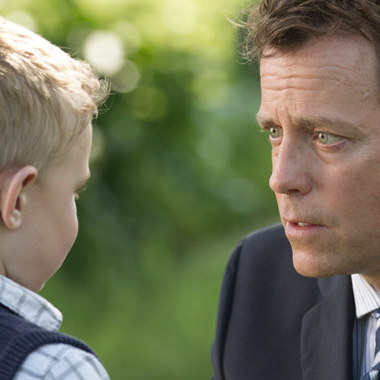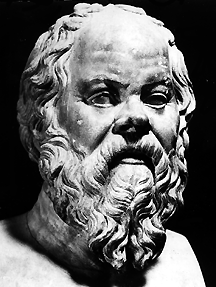Protagoras and Me
Devra Torres | Apr 15, 2014 | 3 cmts
I thought I believed in objective truth. Then my eight-year-old got diabetes, and I realized I had just been pretending. It turned out that, practically speaking, I was a relativist.
What's a practical relativist? Well, did you ever hear of “practical atheism”? Atheists who know they’re atheists believe there is no God, and they can tell you the reasons why. These may be carefully considered, coherent reasons, or they may not, but at least these people know what they believe.

A “practical atheist” says he believes in God, but his actions are indistinguishable from an unbeliever's. This “belief” makes no practical difference in his life. It’s not just that he doesn’t feel God's presence, or that he doesn’t live up to his convictions. He really doesn’t believe at all.
An odd thing about human beings is that sometimes we ourselves don’t know what we believe. We can go on for years complacently assuming we assent to some proposition—even something fundamental, like "the afterlife exists"--without really believing it at all.
In “Heaven is for Real,” a pastor's four-year-old comes back from the hospital after a life-threatening illness saying he's seen heaven. The pastor is thinking out loud before his congregation. (I’m quoting from memory here.) “If we believed heaven was real,” he says, “We’d live differently, wouldn’t we?” He pauses, looking honestly perplexed. “Wouldn’t we?” he repeats.

Well, you'd think so.
The idea that truth is objective—that, in Flannery O’Connor’s words, it doesn’t change “according to our ability to stomach it”— has been pivotal in my life. It played into my decision to become Catholic at 13 (in a fuzzy kind of way). Once I became convinced it was all true, there was nothing to do but join the Church. We knew people who went to mass because they liked the Catholic nursery better than the Baptist one, or because they were French Canadians, but our family went because we believed it was all true.
Later I studied philosophy and honed my abilities to show how incoherent you become as soon as you deny that truth is objective.

Anyone who could out-articulate the relativists like I could, it seemed to me, understood that she was in the business of acknowledging truth, not inventing it. I knew I didn't live up to the truth about the universe very well. But I had no conscious intention of defying it.
When my daughter was diagnosed, though, something disconcerting happened. She was supposed to count carbohydrates, eat wholesome food, get daily exercise, plan out her meals, and eat no more and no less than the plan dictated. (You don't get juvenile diabetes from failing at nutrition and exercise, but these are an important part of the treatment.) We had to do blood tests and injections before each meal and throughout the day and night.
I was familiar with counting carbs—up to the point when it got too burdensome to bother with. I tried to feed my kids well and see that they got exercise, of course, but within certain limits: the ones I chose to set. I could see the value of regular mealtimes and not letting the kids hide their peppers under the tablecloth, and I arranged things accordingly, more or less--but I was still in control.

The truth about health and nutrition (and everything else) did exert a certain drag on my worst instincts: it led me to do a little more good than I felt like doing, but it only dragged me so far. I thought of myself as a conscientious person, never noticing that I always reserved an absolute right to draw the line where I chose.
In fact, I was fairly self-righteous about having such nice, reasonable standards. I was the pleasant, easygoing, spontaneous type, able to make peace with my limitations. Protagoras at least thought man was the measure of all things. I thought Devra Torres was.
I thought Devra Torres was.
Suddenly I had to inject insulin into my daughter’s arm or leg five times a day. I had to count carbs—not up to some nebulous point at which I, The Decider, declared it no longer worth the trouble, but every time, correctly, because that is what wards off seizures and coma and death. I had to write down her glucose numbers not when I got around to it, but every single time. I had to do the 3AM glucose reading, regardless of whether I felt that was a reasonable demand for the universe to make on Devra Torres.
So I found out I was a fraud. That was disconcerting. On the other hand, I never thought I had it in me to be this meticulous about anything. I didn't have it in me, it turned out, to put my sloppiness and sloth ahead of my beloved daughter's survival. That was encouraging.
The moral? Know thyself. But don't be too sure that what you think you know is so.

Comments (3)
Rhett Segall
Apr 17, 2014 11:55am
Thanks for your practical insights, Derva. I have been re-searching Maritain's Education at the Crossroads for a maxim that is most relevant to your sharing: "The unbending quality of the the simplest natural truth" . I think it was in the context of manual work.
I once worked with a cabinet maker of sorts and my measurements were off only slightly but it still ruined the work. Despite the fact that I'm a good person there was no pity! It had to be done over!
Despite the fact that Thomas Merton was a man of God, his gentlest touch on an exposed electric wire electrocuted him.
Such, from one perspective, is the way of truth!
Sapperdepitjes
Apr 24, 2014 4:48am
"Do things seriously, but don't take yourself serious."
Devra Torres
Apr 25, 2014 9:17pm
Rhett, yes, and it reminds me of the metaphor about navigating a ship, and how a little inaccuracy leads you to end up hundreds or thousands of miles from your destination. It's so easy to get used to being judged on your good intentions instead of results.
Jos, yes, it's a good distinction. It's a mistake to think that only people who take themselves seriously are concerned to do things well. (I don't know if this is a common mistake, but it's handy as a copout.)